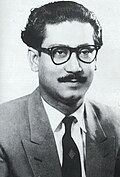| << | March 1971 | >> | ||||
|---|---|---|---|---|---|---|
| Su | Mo | Tu | We | Th | Fr | Sa |
| 1 | 2 | 3 | 4 | 5 | 6 | |
| 7 | 8 | 9 | 10 | 11 | 12 | 13 |
| 14 | 15 | 16 | 17 | 18 | 19 | 20 |
| 21 | 22 | 23 | 24 | 25 | 26 | 27 |
| 28 | 29 | 30 | 31 | |||



The following events occurred in March 1971:
Contents
- March 1, 1971 (Monday)
- March 2, 1971 (Tuesday)
- March 3, 1971 (Wednesday)
- March 4, 1971 (Thursday)
- March 5, 1971 (Friday)
- March 6, 1971 (Saturday)
- March 7, 1971 (Sunday)
- March 8, 1971 (Monday)
- March 9, 1971 (Tuesday)
- March 10, 1971 (Wednesday)
- March 11, 1971 (Thursday)
- March 12, 1971 (Friday)
- March 13, 1971 (Saturday)
- March 14, 1971 (Sunday)
- March 15, 1971 (Monday)
- March 16, 1971 (Tuesday)
- March 17, 1971 (Wednesday)
- March 18, 1971 (Thursday)
- March 19, 1971 (Friday)
- March 20, 1971 (Saturday)
- March 21, 1971 (Sunday)
- March 22, 1971 (Monday)
- March 23, 1971 (Tuesday)
- March 24, 1971 (Wednesday)
- March 25, 1971 (Thursday)
- March 26, 1971 (Friday)
- March 27, 1971 (Saturday)
- March 28, 1971 (Sunday)
- March 29, 1971 (Monday)
- March 30, 1971 (Tuesday)
- March 31, 1971 (Wednesday)
- References
















